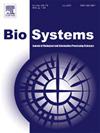Constructal thermodynamics and its semantic ontology in autopoietic, digital, and computational architectural and urban space open systems
IF 1.9
4区 生物学
Q2 BIOLOGY
引用次数: 0
Abstract
This paper explores the intersections of constructal thermodynamics, and its semantic ontology within the context of autopoietic, digital and computational design in protocell inspired numerical architectural and urban narratives that are examined here as open systems. Constructal law is the thermodynamic theory based on the analysis of fluxes across the boundaries of an open system. Protocells, as dynamic, autopoietic and adaptive open finite size systems, serve in this paper as a compelling metaphor and design model for responsive and sustainable manmade architectural and urban environments. The ability of protocells to harness energy, minimize entropy, and adapt to environmental changes mirrors the principles of constructal thermodynamics, which govern the flow and distribution of resources in complex self-organizing information open systems in nature. By applying these principles to digital architecture, this study investigates how relational dynamics between spaces, materials, and functions can create adaptive designs that “go with the flow” of ecological and cultural systems. The research demonstrates using the Gouy-Stodola theorem as a variational principle, how protocell-inspired processes facilitate exergy-efficient designs, minimizing waste while maximizing resilience and flexibility. The present paper argues -through an applied case study- for a paradigm where protocell digital architecture serves not only as an ecological and material model but mainly as a spatial narrative driver, blending constructal and digital tools with cultural mythos. Finally, this paper exploring simultaneously the semantic complexity and ontology of such systems, in turn, connects these constructal driven digital designs to broader poly-narratives, embedding cultural, symbolic, philosophical and functional predicates into architectural forms.
自造、数字和计算建筑和城市空间开放系统中的构造热力学及其语义本体。
本文探讨了结构热力学的交叉点,以及它在原生细胞启发的数字建筑和城市叙事中的自生学、数字和计算设计背景下的语义本体,这些都是作为开放系统进行研究的。构造定律是建立在对开放系统边界上的通量分析基础上的热力学理论。原始细胞作为一种动态的、自适应的、开放的有限大小的系统,在本文中为响应性和可持续性的人造建筑和城市环境提供了一个令人信服的隐喻和设计模型。原始细胞利用能量、最小化熵和适应环境变化的能力反映了结构热力学原理,该原理支配着自然界中复杂的自组织信息开放系统中资源的流动和分配。通过将这些原则应用到数字建筑中,本研究探讨了空间、材料和功能之间的关系动态如何创造出适应生态和文化系统的自适应设计。该研究展示了使用Gouy-Stodola定理作为变分原理,原型细胞启发的过程如何促进高效能设计,最大限度地减少浪费,同时最大限度地提高弹性和灵活性。通过一个应用案例研究,提出了一种范式,在这种范式中,原始细胞数字建筑不仅可以作为生态和材料模型,还可以作为空间叙事的驱动力,将结构和数字工具与文化神话相结合。最后,本文同时探讨了这些系统的语义复杂性,进而将这些结构驱动的数字设计与更广泛的m -叙述联系起来,将文化、符号、哲学和功能谓词嵌入到建筑形式中。
本文章由计算机程序翻译,如有差异,请以英文原文为准。
求助全文
约1分钟内获得全文
求助全文
来源期刊

Biosystems
生物-生物学
CiteScore
3.70
自引率
18.80%
发文量
129
审稿时长
34 days
期刊介绍:
BioSystems encourages experimental, computational, and theoretical articles that link biology, evolutionary thinking, and the information processing sciences. The link areas form a circle that encompasses the fundamental nature of biological information processing, computational modeling of complex biological systems, evolutionary models of computation, the application of biological principles to the design of novel computing systems, and the use of biomolecular materials to synthesize artificial systems that capture essential principles of natural biological information processing.
 求助内容:
求助内容: 应助结果提醒方式:
应助结果提醒方式:


